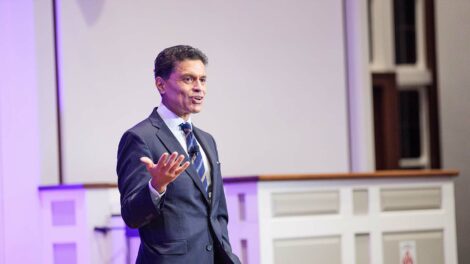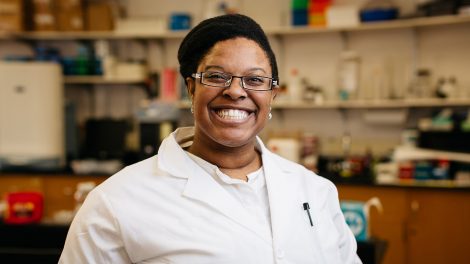Award-winning science author/journalist Laurie Garrett discusses role of denial, misinformation, and propaganda in pandemics—and how we can prevent history from repeating itself
By Stella Katsipoutis-Varkanis

Laurie Garrett
On March 25, Laurie Garrett delivered this year’s Robert (’69) and Margaret Pastor Lecture, titled “Pandemics, Urban Spaces, and the Future of Global Health.” Garrett is a renowned science author and journalist who has been decorated with such prestigious awards as the Pulitzer Prize, George Foster Peabody Award, and George Polk Award in Journalism. She is a frequent contributor to MSNBC and a columnist for Foreign Policy magazine.
Dubbed “the woman who predicted the coronavirus pandemic,” Garrett addressed the Lafayette community about the role of denial, misinformation, and propaganda in pandemics, and how we can learn from the past in order to prevent the repeating of history.
The annual lecture series event—an integral part of global education at Lafayette—is made possible by the generous support of the Pastor family, which has enabled the College to invite significant public figures to campus, such as President Jimmy Carter, Ambassador Lakhdar Brahimi, and influential scholar Joseph S. Nye, among others. Also part of the College’s Global Cities Initiative, Garrett’s lecture was co-sponsored by Lafayette’s International Affairs Program, Department of Biology, and Health, Life Sciences, and Society Program. The evening’s program was moderated by Angelika von Wahl, chair of international affairs.
“What was notably missing over the last year were clear and strong voices educating us and communicating the scientific aspects of the grave biological threat of the coronavirus,” said Von Wahl as she introduced the evening’s guest speaker. “As people were trying desperately to find answers on how to avoid the virus and get through this pandemic, they often found themselves sailing through the dark. The lonely North Star, for me, were Dr. Fauci and Laurie Garrett, always shedding light and always sticking to their scientific guns. It takes guts to speak truth to power, and Garrett was repeatedly the most clear-eyed, trusted, and outspoken commentator in this process.”
Garrett started off the evening by drawing comparisons between COVID-19 and 1918 influenza pandemic, which infected an estimated 500 million people around the globe post-World War I. Government response to the two global events was strikingly similar, she explained, with both marked by a downplaying of the viruses’ severity by government leaders, inconsistent safety measures being taken across the United States, mass shutdowns, mask-wearing mandates, and disproportionately affected immigrant and minority communities. One difference, however, is the sheer magnitude of the impact coronavirus had on the modern world.
“Just three years ago, on the 100th anniversary [of the 1918 flu pandemic], leading experts tried to estimate what would happen if such a catastrophic pandemic hit today,” Garrett said. “Larry Summers, the treasury secretary under President Barack Obama, estimated 720,000 deaths and said it could cost even as high as $500 billion. And of course, over the last 14 months, we’ve seen far worse than that. Now, Summers has called the COVID-19 pandemic the ‘$16 trillion virus.’”
One of the main causes of the massive outbreak, Garrett went on to express, was the failure of “two very seriously flawed, ego-driven leaders”—Chinese president Xi Jinping and U.S. President Donald Trump—to swiftly and appropriately respond to the rapidly growing crisis.
Garrett went on to detail what she views were the missteps of the leaders of the American and Chinese governments from the outset of the pandemic until early 2021: the withholding of information about the virus, the misrepresentation of the number of infections, a lack of clear and consistent guidance for preventing the spread of the virus, the disregard of the measures set forth by scientific experts for mask-wearing and social distancing, and the prioritization of political interests over public health, among other things.
These missteps, Garrett said, led to millions of infections and deaths, overrun hospitals and overworked medical personnel, a shortage of personal protective equipment and burial space, stores barren of much-needed supplies, record unemployment levels, deep political division, and the largest global economic collapse since World War II.
“Spread, of course,” Garrett said, “by the insane cycle of people refusing to carry their side of the problem, and our own activities and our own unwillingness to take precautions and to abide by appropriate behavior.”
What the world needs to do in order to prevent a catastrophe of this magnitude from reoccurring in the future, Garrett emphasized, is implement global governance and leadership, ensure the full vaccination of more than half of the global population, support organizations such as COVAX that help bring vaccines to third-world countries, and exhibit unity and solidarity amongst countries in regard to vaccinations.
“Public health is about protecting populations and preventing disease in the first place, as opposed to treating disease once it has already taken hold,” Garrett said. “COVID-19 is not a laughing game, and it must be taken very seriously. We’re in a race right now against viral evolution. Unless we’re prepared to bolster our global vaccination capacity, then we’re rendering ourselves vulnerable to the need for an endless cycle of revaccination against an evolving virus. It’s my hope that we will see some sanity eventually emerge in the coming days, in particular sanity about globalization of the response.”
The lecture was followed by a smaller Zoom discussion attended by Garrett; Margaret and Kip Pastor, the evening’s generous donors; Khadijah Mitchell, Peter C.S. d’Aubermont, M.D., ’73 Scholar of Health and Life Sciences, assistant professor of biology, and Pennsylvania COVID-19 vaccine joint task force member; as well as select students and faculty from international affairs, biology, and health, life sciences, and society who are specifically interested in global health.


